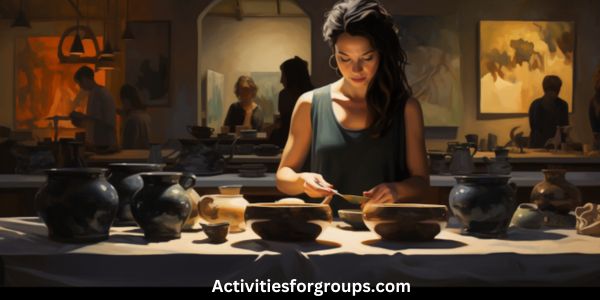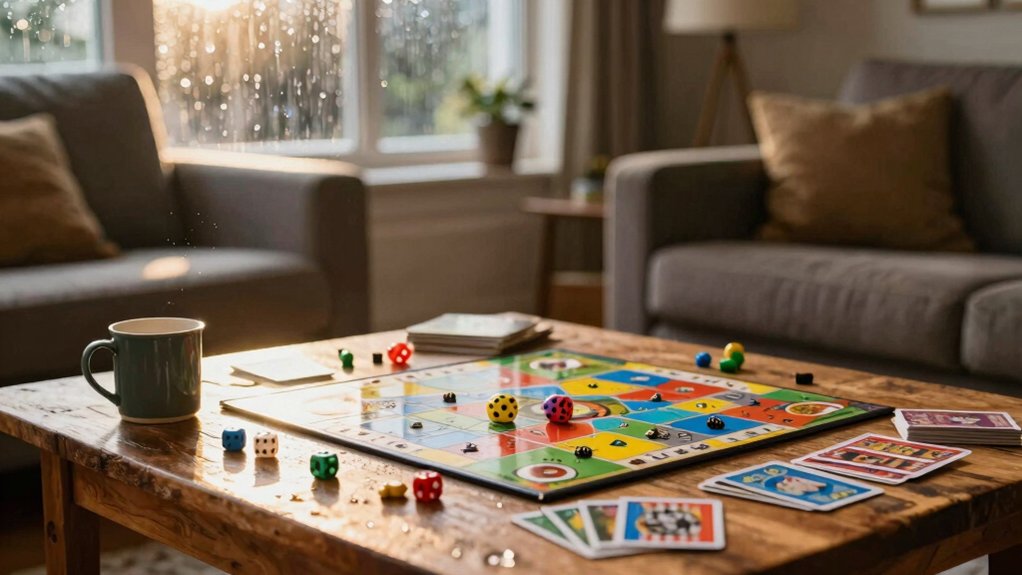Are you trying to decide between group craft workshops and individual lessons? You’re not alone. It can be difficult to determine which is the best option for you.
Read on to learn the advantages and disadvantages of both, as well as what types of crafts are best suited for each option.

Plus, get an overview of the cost comparison. You’ll be able to make an informed decision in no time!
Advantages of Group Craft Workshops
You can reap many benefits from participating in group craft workshops. Not only do you get to learn from a professional, but you’ll also get to socialize with like-minded people and have fun.
Group workshops tend to be more affordable than individual lessons, making them a great way to save money. You’ll also get the chance to learn new ideas from the people around you, and this can help you to become more creative in your projects. Plus, you’ll be able to ask questions and get feedback from your peers and instructor that can help you improve your skills.
Group workshops can also help to keep you motivated and inspired. Seeing what others are doing and hearing their stories can help to spark your own ideas and get you motivated to complete a project. You’ll also get to see how other people approach different tasks, allowing you to learn from their techniques and styles.
Lastly, you’ll be able to form connections and relationships with other craftspeople. This can be great for networking and finding resources for future projects. Group craft workshops can be a great way to learn, save money, and make valuable connections.
Advantages of Individual Lessons
If you’re looking to get the most out of your craft learning experience, individual lessons may be the way to go. With personalized instruction tailored to your specific needs, you can rest assured that you’re getting the exact help you need.
Plus, individual lessons will allow you to make progress at your own pace.
Personalized Experience
Experiencing craft lessons on an individual basis offers a more personalized approach to learning. With a private instructor, you’ll have the undivided attention of an expert who can tailor the lesson specifically to you. Plus, you’ll have the freedom to ask questions and get immediate feedback without the pressure of a group setting.
| Advantages of Individual Lessons | Advantages of Group Lessons |
|---|---|
| Personalized Attention | Group Dynamics |
| Ask Questions | Encouragement |
| Immediate Feedback | Variety of Skills |
| Flexible Schedule | Cost Savings |
Tailored Learning
One of the greatest advantages of individual lessons is the tailored learning experience. With individual instruction, the student is able to tailor the lesson to fit their specific needs and interests. They can work at their own pace, tailor the lesson plan to suit their learning style, and focus on topics that interest them. Because individual lessons are one-on-one, the teacher can better assess the student’s strengths and weaknesses, allowing them to focus their attention on areas that need improvement. They can also provide tailored instruction and guidance to help the student reach their goals.
Individual lessons also provide more flexibility. Instead of being bound to a set schedule, students can work with the instructor to set a timeline that fits their needs and interests. This allows them to complete their studies and projects quickly and easily, and at their own pace. They can also take a break if needed and resume where they left off.
With the tailored learning experience, students can get the most out of their lessons.
Types of Crafts That Benefit From Group Workshops

Crafting together can be a great experience, especially when working on projects that involve group dynamics or collaborative efforts. From pottery to painting, there are many crafts that can be enhanced by gathering as a group to work together.
Let’s explore some of the types of crafts that benefit from group workshops.
Group Dynamics
You can experience the benefits of group dynamics in crafting certain types of art projects. Group workshops are ideal for collaborative crafts such as quilting, scrapbooking, and mural painting. These activities require communication, teamwork, and problem-solving skills, which are all enhanced when done in a group.
Working with others can also help to promote creative thinking; brainstorming and bouncing ideas off of one another can lead to more innovative projects.
In a group setting, individual skills and talents can be shared, creating a supportive environment for the entire team. With more resources, each member can learn from one another and explore new ideas. Working with others also encourages accountability and can help to keep everyone motivated and on task.
Group workshops are an excellent way to have fun and bond while creating something special. Whether it’s a quilt, scrapbook, or mural, the camaraderie of the group will help to make the experience even more meaningful.
Collaborative Projects
You’ll find that certain types of crafts benefit from being done in a group setting, such as quilting, scrapbooking, and mural painting. Crafting together can help to encourage collaboration and deepen relationships.
Here are some of the main benefits of crafting in a group workshop:
- Building relationships:
- Working together encourages conversation and helps to strengthen relationships.
- Teamwork on a project can foster a sense of camaraderie and belonging.
- Enhancing creativity:
- Brainstorming ideas in a group can help to spark imagination and new ideas.
- Having the support of a group can help to build confidence when trying new techniques.
Types of Crafts That Benefit From Individual Lessons
Frequently, you’re better off taking individual lessons for certain types of crafts. Woodworking, for example, requires precision and accuracy that’s hard to achieve in a group setting. Individual lessons can also be beneficial for more intricate crafts, such as sewing and crochet. In one-on-one lessons, you can learn the basics in a shorter period of time and get personalized attention and feedback from an experienced instructor.
When it comes to painting, it’s particularly advantageous to take individual lessons. This allows you to receive personalized instruction on how to use the various brushes and techniques, as well as the color mix for different effects. Individual lessons are also great for sculpting and pottery, as you can get guidance on the right tools and materials to use.
In contrast, group workshops are beneficial for some crafts that don’t require as much precision or attention to detail. This includes activities like jewelry making, candle making, and flower arranging. In these cases, the instructor can provide general guidance and the group can work together to complete the project.
Individual lessons are also beneficial for those who are limited in time and want to learn quickly. Private lessons can be tailored to your specific needs and goals, so you can learn the craft in a shorter period of time.
Ultimately, it comes down to personal preference. Group workshops are great for certain crafts, while individual lessons are better for more intricate projects. Consider your needs and goals before deciding which option is best for you.
Cost Comparison of Group Craft Workshops and Individual Lessons

Comparing the cost of group craft workshops and individual lessons can help you decide which option is best for you. Generally, individual lessons are more expensive than group workshops, as you’re paying for personalized instruction and access to different materials.
Group workshops provide an opportunity to learn with other people and may also offer discounts when multiple people register together.
When looking at costs, consider the following:
- Group Workshops:
- Price: The cost of a group workshop is usually cheaper than an individual lesson.
- Materials: Materials may be included in the cost, or a discount may be offered if multiple people register.
- Individual Lessons:
- Price: It’s generally more expensive for individual lessons as they’re tailored to the individual and specialized materials may be needed.
- Materials: Materials are often not included in the cost.
Pros and Cons of Group Craft Workshops
Your experience with group craft workshops can have both advantages and disadvantages. Group workshops are often cheaper than individual lessons, and they can be a great way to learn new skills or share ideas with other like-minded people.
On the other hand, you may not get as much individual attention or instruction as you would in a one-on-one session.
| Pros | Cons |
|---|---|
| Cost-effective | Less individual attention |
| Opportunity to share skills | Less structure |
| Learn from others | More distractions |
| Sense of community | Less tailored instruction |
Group workshops provide an opportunity to learn from others and build a sense of community, but it may be difficult to stay on task with more people involved. In addition, the instruction may not be as tailored to your specific needs as it would be in a private lesson.
Pros and Cons of Individual Lessons
Your experience with individual lessons can have both advantages and disadvantages.
Pros:
- Focused attention: With individual lessons, the instructor can focus on the student’s unique learning style and needs, providing more detailed instruction.
- Personalized schedule: Students can schedule lessons at their own convenience and pace, allowing them to learn at their own speed.
Cons:
- Cost: Individual lessons tend to be more expensive than group workshops.
- Time: As individual lessons take more time to complete, it may take longer to master the craft.
Frequently Asked Questions [FAQs]
What Is the Maximum Number of People Allowed in a Group Craft Workshop?
How many people can attend a group craft workshop? That depends on the size of the venue and the type of activity. Generally, groups of up to eight are ideal for most workshops.
What Is the Average Duration of a Group Craft Workshop?
The average duration of a group craft workshop is typically around one or two hours. You’ll get plenty of time to learn new skills and create some amazing projects!
Are Group Craft Workshops Suitable for All Age Groups?
Yes, group craft workshops are suitable for all age groups. They provide an opportunity to have fun while learning new skills and interacting with others.
Are There Any Safety Considerations to Be Aware of When Taking Part in an Individual Lesson?
When taking part in an individual lesson, safety should always be a priority. Ensure the instructor is qualified, wear protective gear, and follow any rules or guidelines they provide. Be aware of your surroundings and be prepared to stop if something doesn’t feel right.
Are There Any Additional Costs Associated With Taking Part in a Group Craft Workshop?
Yes, there are additional costs associated with taking part in a group craft workshop. Supplies like paint, paper, and tools may need to be purchased, and you may need to pay a fee for the instructor’s time.
Conclusion
When it comes to craft workshops and lessons, there’s no one-size-fits-all approach. It depends on the type of craft, the skill level of the students, and the budget.
Group workshops are great for those who want to learn in a social setting, while individual lessons are beneficial for more advanced crafts and those who need more one-on-one instruction.
Ultimately, it’s up to you to decide which option best fits your needs.




Leave a Reply